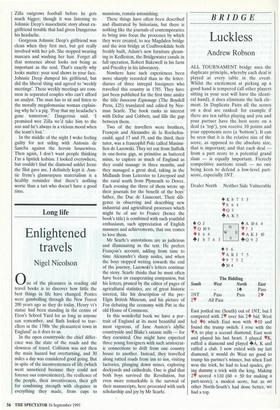BRIDGE
Luckless
Andrew Robson
ALL TOURNAMENT bridge uses the duplicate principle, whereby each deal is played at every table in the event. Whilst the excitement at picking up a good hand is tempered (all other players sitting in your seat will have the identi- cal hand), it does eliminate the luck ele- ment. In Duplicate Pairs all the scores on a deal are ranked: for example if there are ten tables playing and you and your partner have the best score on a deal (a `top'), you receive 10 points and your opponents zero (a 'bottom'). It can be seen that it is the relative size of the score, as opposed to the absolute size, that is important; and that each deal from a part score to a potential grand slam — is equally important. Fiercely competitive auctions result — no one being keen to defend a low-level part- score, especially 1NT.
Dealer North Neither Side Vulnerable The Bidding South West North East 14
Pass
1NT Pass Pass
2♦
211
All Pass
East jostled me (South) out of INT, but I competed with 21P over his 2♦ bid. West led *6 which East won with ♦10 and found the trump switch. I rose with the IPA to play a second diamond; East won and played his last heart. I played vx, ruffed a diamond and played +A, K and ruffed a club. I now exited with my last diamond; it would do West no good to trump his partner's winner, but when East won the trick, he had to lead spades, giv- ing dummy a trick with the king. Making 2V scored +110 (60 + 50 for making a part-score); a modest score, but as no other North-South's had done better, we had a top.


































































 Previous page
Previous page